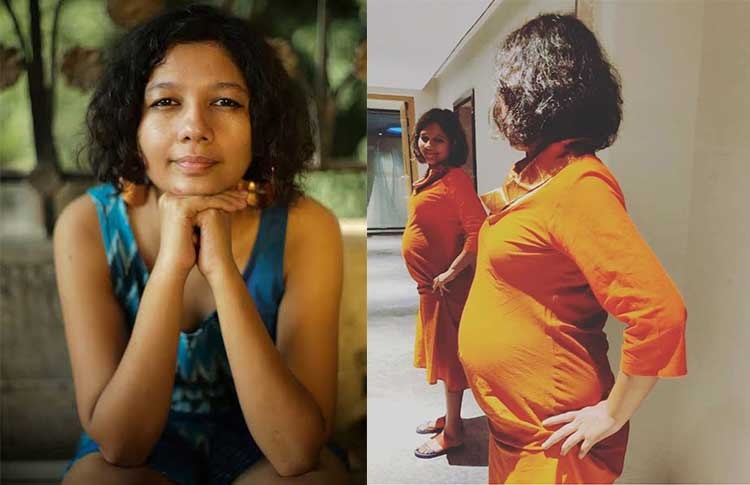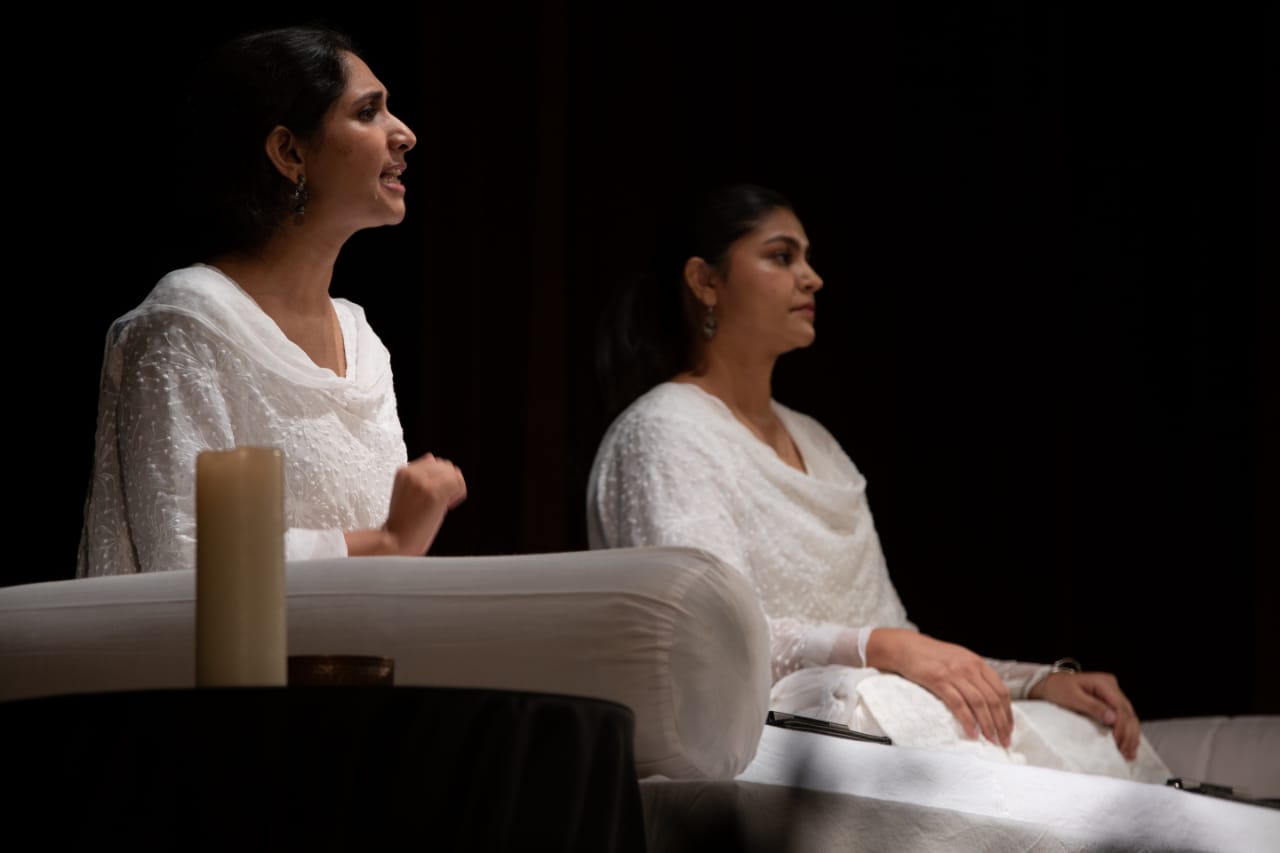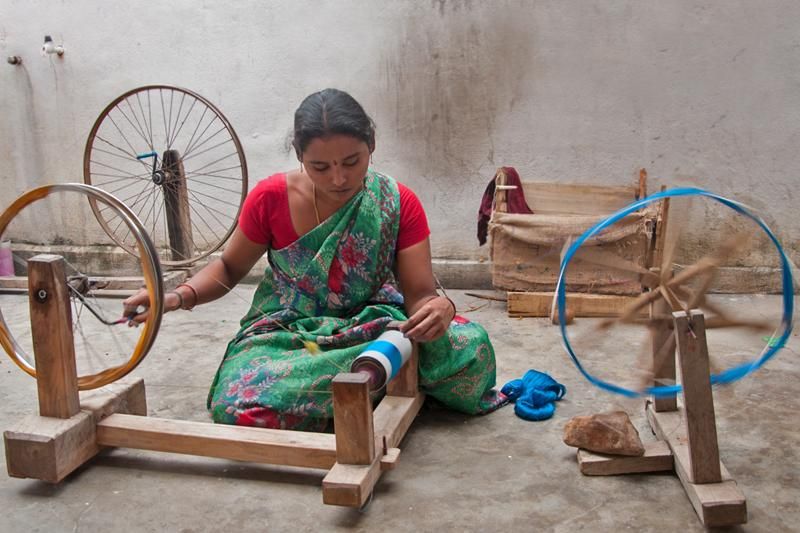Filmmaker Sarah Thomas Calls Out Normalized Misogyny In Entertainment Industry
- IWB Post
- February 1, 2020

“One filmmaker said I should have colour-graded the film because the faces were too gruesome. A line that hit me hard, what he is referring to as gruesome is their daily truth and his words were truly a reflection of society. If something is hard to believe or digest, we conveniently eliminate it or try to dress it better just to make it easy for us,” says Sarah Thomas on her film about acid attack survivors in an interview with IWB.
Sarah Thomas is an award-winning filmmaker and entrepreneur, who has played various roles in her professional journey – director, editor, producer, among others. After having worked on more than 150 ad films, she started her own venture STOM Productions, which is one of the leading production houses in Bengaluru. Sarah’s work focuses on making documentary films that probe deep into political, social, religious, and cultural structures of patriarchy.
Scarred- A documentary on Acid Attacks
No Description
Excerpts,
In the movies, a male character is often shown as a hero despite his misogynistic actions. What do you have to say about the mentality of creators behind such characters?
Filmmakers these days make films with the intention of creating blockbusters and hits, seldom does one think of the social impact a film has on the viewers and on society at large. Films create an unrealistic, stereotypical and limiting perception of women that endorses an already established parochial view of gender that exists in a patriarchal society such as ours. It also creates false perceptions of how a man must be, causing violence and aggression as the norm to be accepted as a ‘true man’ in society. Storylines cater only to the male gaze and what would create a wholesome and logical picture in the minds of a viewer who is accustomed to the traditional gender roles. While filmmakers justify this as the truth of society, they do not understand that glorifying abuse is furthering it in the real world. There is a need for female filmmakers to go behind the lens and take the reins of storytelling into their own hands, only then will a female perspective come to light.
There is also a dire need for topics such as abuse and rape to be handled with sensitivity. In many films, abuse is sensationalized and becomes a normal part of stories, either incorporated through lyrics in songs or through nasty dialogues exchanged between characters. This slowly normalizes violence against women. Thus, demeaning every woman’s experience with gender-based abuse. Of course, we have also seen films that deviate from the norm and tell truths about women, their wants, their needs, their desires. It is society that does not accept them and these films flop. There either needs to be amass revolution in storytelling with filmmakers approaching topics with sensitivity and sensibility or we must take the slow route of gradual change one film after the other.
I am not the right judge of a director’s mentality behind creating fictional toxic masculine characters but I do understand the power of films and how they perpetuate misogyny and that needs to stop for the betterment of men and women.
The objectification of women in films is a routine practice. What can be done to sensitize people about the issue?
You cannot sensitize people and make them aware of a habit that has grown over decades and that they have come to believe is the way of life – their belief that a woman is meant for gratification and child-rearing. This is a common thought across class, caste, race and cultures and our films are a reflection of it. What we can do is start bringing realistic characters that people can connect with. Sensitize people about real issues, handle topics of rape, abuse, eve-teasing with responsibility. As filmmakers we have a huge burden on our shoulders, we influence masses through three hours of our vision on the big screen, it is important to understand this power and use it for the best. Not all filmmakers can be social activists and there is no need for that, but all filmmakers can be responsible storytellers.
Your film ‘Scarred’ tell stories of survivors of acid attacks. Can you tell us about the scars of survivors that society leaves unattended?
There is a huge gap in the depiction of acid attacks on women on screen and their reality. News fails to report the trauma – mental and physical that the victims go through. While filming Scarred I realized that news channels are only interested in showing a ‘before and after’ picture of the victim and nothing more. Not the costs of her hospital bills, the compensation given by the government, the amount they suffer after. The procedure for reconstructive surgeries and the lack of proper laws to govern and protect the women in this country.
The media does not talk about why perpetrators always target the face of the victim, not the body because for him the woman is nothing more than a face and with that destroyed he believes that so is her life. Society must understand the underlying message behind the attacks, a message of fear and submission sent out to all women through one attack. It is the perpetrator’s way of punishing a woman who he thinks isn’t following her traditional gender role of accepting and acknowledging him. It is a way of telling women that there is no freedom or consent in a relationship.
As per our research during the making of the film, we learned that most attacks were either by suitors who were rejected by the victim or the victim’s husband itself. These are important facts that viewers are never taught about. As such, victims do not get enough support mentally through society and fight a hard battle to be accepted as a normal person. There aren’t much government-organized rehabilitation and free surgeries provided to victims, this makes their struggle all the more difficult. The mental trauma remains for life.
Why does our society condemn the acid attack survivors to the life of isolation?
Society judges people by their cover and never really wants to know who a person is on the inside. One of the survivors, Jayalakshmi, narrated the incident that occurred on the bus. She said people looked at her, mocked her openly and there were a mother and son who pointed at her and burst into laughter. She felt humiliated and terrible but this was her daily life and she was used to it. With the growing unrealistic standards of beauty perpetuated by mainstream media, there are very few young women who feel complete and confident in their skin. There is a constant feeling of being incomplete and requiring filters, photoshop and plastic surgery to look and be a certain way.
When I released Scarred, I sent it to a filmmaker as a part of my resume. I got a callback and while giving me feedback on my work, he said I should have colour-graded the film because the faces were too gruesome. A line that hit me hard, what he is referring to as gruesome is their daily truth and his words were truly a reflection of society. If something is hard to believe or digest, we conveniently eliminate it or try to dress it better just to make it easy for us. What we must be doing is bringing up discussions on public forums on justice and creating dialogue on important issues from a personal standpoint.
Your other documentary ‘The Unsung’ talks about the marginalized Halakki Vokkaliga tribe. How does the fight for the identity of this tribal community affect its women?
I was interested in filming The Unsung as I had read about the tribe and their culture. It was one among the many that are on the brink of losing their identity. While the young have taken to dressing, behaving and speaking like the city dwellers, the old live in hopes that the younger generation will follow their culture and go back to the villages. This contrast, two worlds so apart yet merging into one was what drew me to make the film. I soon learned that the tribe had about 1000 songs that are now treasures that will die with just a handful of old ladies. They sing these songs as they travel to different villages in hopes that their grandchildren would learn them. But they all turn away. Surprisingly, the people fighting to preserve what is left of their culture are old women in their twilight years with so many stories to tell as songs. In my conversation with them I learned that while the women are leading the fight, they still believe in being submissive to their husbands, irrespective of the men being earning members or not. The word of the man is final.
Women of underprivileged backgrounds throughout history have faced a double discrimination one by the society at large and one from the men in their own community. The Halakki tribe is mostly egalitarian in their approach to education and employment. However, due to poverty, most of them do not take up higher education and start working at an early age. Those that are educated up to postgraduation find it difficult to get jobs. There is a high amount of unemployment in the community. As such, the men have taken to drinking while the responsibility of running the family rests on the women.
Your new project ‘Letters To My Abusers’ deals with the sensitive subject of sexual child abuse. What did you observe in the process of writing such letters? How does the initial anger transform into a positive force of healing?
Letters To My Abuser is an account of adults who have gone through child sexual abuse depicted through letters they will be writing to their abuser. Most of the victims of child sexual abuse have been abused by their closest ones and in most cases by family members. Through my research and conversation with the victims, I learned that while abuse leaves them feeling terrible it attaches a feeling of self-blame and guilt that the victim carries throughout his or her own life. This incident changes the very decision that these individuals take and shapes their perspective of society at a very young age, one that they find hard to overcome. It also leaves them feeling vulnerable and leading to more abuse. Most times the victims as children knew that there was something bad happening to them but did not have the maturity at that tender age to understand the graveness of what was happening. Those abused by family members, close blood relatives like their father found it hard to comprehend their relationship. While there are disgust and anger, there is also a feeling of love towards the father. These are complex emotions that the film seeks to throw light on.
I do not think the anger transforms into healing, it is making sense with reality and in some cases forgiveness that transforms to healing but in most situations, anger turns to larger psychological problems that must be addressed. For an issue that is this ingrained in our culture, social and political systems, change does not come at a superficial level. It has to start within homes and that can happen only if there is dialogue being created within small groups, among people on the street, in colleges, in offices. Dialogues lead to a grapevine effect and slowly talk will become action. As long as we remain mute spectators to discrimination, marginalization, abuse, and misogyny, the world will not change. There needs to be more men and women that come out and raise their voice and make sure they are heard even if it is in a small intimate group of friends. This is what will make us progressive and take the country forward.
Sarah is currently writing a book, ‘Cells and Constellations,’ which is an anthology of poetry exploring the complexity and simplicity of love and life. The book is scheduled to release this year.
- 0
- 0













